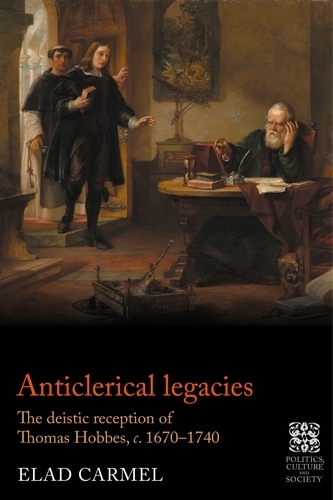
Anticlerical Legacies: The Deistic Reception of Thomas Hobbes, c. 16701740
(Hardback)
Available Formats
Publishing Details
Anticlerical Legacies: The Deistic Reception of Thomas Hobbes, c. 16701740
By (Author) Elad Carmel
Manchester University Press
Manchester University Press
1st February 2024
United Kingdom
Classifications
Tertiary Education
Non Fiction
History of religion
Philosophy of religion
192
Physical Properties
Hardback
248
Width 156mm, Height 234mm, Spine 14mm
491g
Description
Anticlerical legacies explores the reception of Thomas Hobbess political and religious ideas by seventeenth- and eighteenth-century deists and freethinkers, such as Charles Blount, John Toland, Anthony Collins, Matthew Tindal, Thomas Morgan, and many others. It shows that these writers were indebted to various aspects of Hobbess thought, that they engaged with his ideas explicitly in their published and unpublished works, and that they invoked his authority consistently despite the explosive reputation of the monster of Malmesbury.
Hobbes emerges from this study as a major source of anticlerical ideas and toolssomething that his contemporary admirers and critics seemed to agree on but that has been understudied in the scholarship. The battle of Hobbes and his successors against the orthodoxy was also a battle for civil peace, and the rich anticlerical legacies that they left remained influential long after their lifetime.
Author Bio
Elad Carmel is a Kluge Fellow at the Library of Congress and a Daiches-Manning Memorial Fellow in 18th-Century Scottish Studies at the University of Edinburgh.
